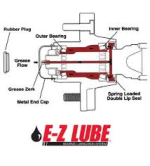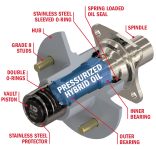How would an EZ Lube blow a seal? It's a totally open system. You can pump 8 gallons of grease through it if you like, the excess all just pushes out the front.
And there's no guesswork, that's actually the whole point of them. You pump until you see clean grease coming out the front, then you're done. It ejects all the old grease, ahead of the new grease.
I think maybe you have EZ Lube confused with Dexter's proprietary system, which adds a second seal to the front end, and so it's like a Bearing Buddy. The Dexter does pressurize and can blow a seal, but not EZ Lube, as one end of the bearing assembly is wide open... only a dust cap that's removed while greasing, and which holds no pressure.
Neither system requires guess work. You pump EZ Lube until you see clean grease coming out, and you pump Bearing Buddies or Dexter until the spring compresses, stopping before the plunger bottoms out against a fully-compressed spring. The trouble is that too many people don't know this, and over-pressurize the Dexters or Bearing Buddies, causing the problem you found... seals blowing out. EZ Lube prevents this.
EZ Lube:
View attachment 4171734
Dexter:
View attachment 4172284
Disassembling hubs to manually pack bearings with grease certainly works, there's nothing wrong with it if you have time to burn. But I'm not going back to that, when there are options today that are better in every possible way.


